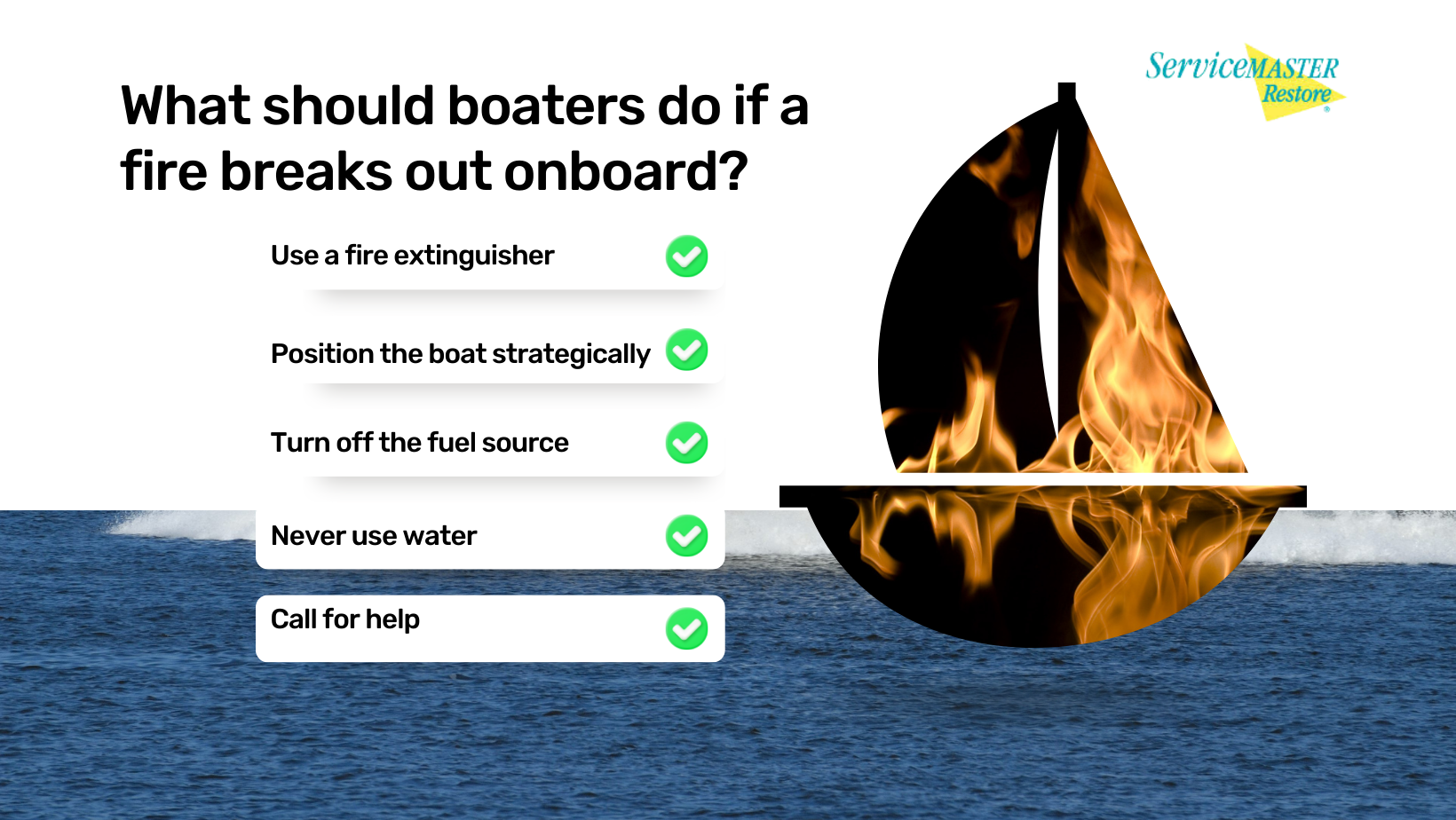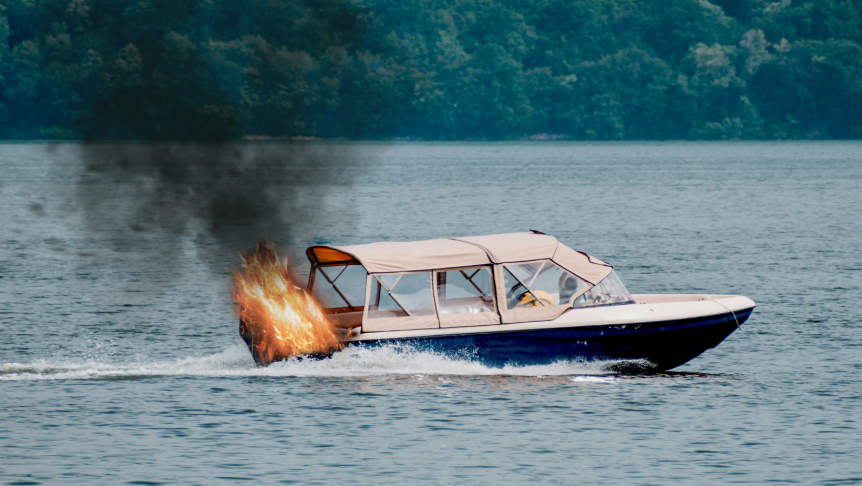Fires onboard boats are common occurrences. These fires are dangerous, as they can spread quickly in the minimal space. If a fire blazes out of control, the only place for boaters to go is into the water. When a fire erupts onboard the boat, here’s what to do.
What are the causes of boat fires?
Most fires start in specific places onboard a boat, like the engine compartment. Here, fuel and an ignition source combine to produce hazardous results. Maintaining the boat, especially the electrical and fuel systems, can prevent a disastrous fire on the boat.
Battery-related fires also occur on boats. They may be caused by loose battery connections, chafed battery cables, and old battery switches. Boaters who make errors when operating the boat, such as reversing the battery cables or wrongly connecting the cables, can cause accidental fires.
Engine overheating can also lead to a fire onboard the boat. Or, sediment in water can cause impeller failures, which in turn trigger exhaust fires. It’s important to change the impeller on a biannual basis, after grounding the boat and when sailing through dirty water.
Fires onboard a boat may happen when the boat is not at sea but rather in the marina, the storage facility, the garage, or a neighbor’s house. The marina is where nearly three-quarters of boat fires occur. Most of the time, the fires start on someone else’s boat.
The risk of fire increases when boaters bring onboard appliances, such as a microwave, electrical heater or air-conditioner. When using these appliances, it’s critical to use marine-grade power cords and adapters to prevent the outbreak of fire. As soon as wear-and-tear occurs, replace them.
Wiring harnesses are also responsible for a large number of fires onboard boats that are more than 25 years old. Boaters who operate vintage boats are advised to consider replacing parts that are original. If parts are no longer available, an electrician can assemble them.
What should boaters do if a fire breaks out onboard?

Fuel, oxygen, and heat start and feed a fire. By eliminating one of these elements, the fire can be extinguished. Since most boating fires start immediately after fueling, even turning the ignition to start the engine can result in a boat explosion or fire.
1. Use a fire extinguisher
A fire extinguisher is critical in stopping a boating fire. Always be prepared to use one if a fire starts onboard. Become familiar with how to use the extinguisher by reading the instructions on the label. Also maintain the fire extinguisher so that it functions when needed.
When the flames erupt, grab the fire extinguisher and activate it. Use a horizontal sweeping motion and direct the extinguishment spray at the base of the flames. Short bursts of the fire extinguisher are effective in squashing the flames onboard the boat.
2. Position the boat strategically
A fire may begin when the boat is underway. In this case, stop the boat in a position where the flames are downwind. Use a paddle to keep the bow into the wind. If the fire occurs at the front of the boat, ensure the stern is into the wind.
3. Turn off the fuel source
Instruct all passengers onboard to wear life jackets in the event the boat must be abandoned. Turn off the fire’s fuel source; for example, if the fire erupts from the engine space, turn off the fuel supply. Extinguish the flames using the fire extinguisher.
4. Never use water
Although a boat is surrounded by water, never use water on an electrical fire. Water conducts electricity and can cause an electrocution or severe electrical shock. Similarly, water is unsafe to use when attempting to put out gasoline, oil, or grease fire.
5. Call for help
Once the fire is under control, call for help with the VHF marine radio. After using the fire extinguisher, check that the gauge is charged properly and the seals are intact. Recharge the extinguisher so it is ready in the event of another fire emergency.
What are boat fire emergency tips?
Since boating fires are common, it’s a practical safety measure to be aware of tips that could prevent or mitigate a fire. Install smoke and carbon monoxide alarms onboard to alert passengers of a fire. Develop a fire emergency plan and practice it.
Upon leaving the boat or going to sleep, turn off portable heaters. Avoid overloading power outlets. Check that the cooling and exhaust systems are functional. Regularly inspect the electrical wiring, connections and cords for proper installation and ensure they are in good condition.
Keep the appropriate fire extinguishers in an accessible area on the boat and make sure they are in working order. Improve fire safety by training all boat occupants on how to use the fire extinguisher. Also, always know how to contact help in case a fire breaks out.

Boating is a favorite pastime for many people who live near the water. But when a fire occurs onboard, it’s important to know what to do to keep everyone safe. Once the fire is out, fire damage may have occurred. Call ServiceMaster DRR to restore the fire damaged boat.
We are a reputable fire damage restoration company with a crew of licensed and insured technicians who are skilled in fire damage cleanup. Our mission is to restore your property, whether a residential home, commercial property, or a boat, quickly and efficiently.
Our cleanup specialists utilize powerful equipment and advanced techniques to eliminate soot, smoke, and odors and rebuild damaged structures. If the fire is extinguished by fire officials’ water hoses, we provide mold remediation services to eliminate mold infestations and prevent them from returning.
ServiceMaster DRR proudly serves property owners in San Fransico, California. Our team of expert fire damage restoration technicians is available 24 hours a day to respond promptly to fire damage emergencies. Call us when you need efficient, professional fire damage cleanup.

Steve VanDenBerg is the owner of ServiceMaster Disaster Restoration and Recovery. He has over 30 years of experience working within the restoration industry and successfully leading start-ups, turnarounds, acquisitions and mergers, and rapidly growing companies.
Steve earned his BS in Business & Accounting from Calvin University in Grand Rapids, MI and began working for DSI Holdings as their Chief Financial Officer. When Steve began with DSI Holdings, they were running an underperforming ServiceMaster Restore franchise with one location. Steve implemented new policies and procedures for accounting and finance as well as a professional sales plan that increased profits eightfold over his time as the CFO. He was then promoted to President and CEO and in this time, he expanded the company from two locations with $4M in sales to 12 locations and $45M in sales. DSI Holdings became one of the largest disaster restoration companies in the U.S. and helped with major restoration projects throughout the U.S. and around the world.
Steve purchased ServiceMaster DRR in 2015 when the business was in decline. Drawing on his years of experience in turning around struggling ServiceMaster franchises, Steve overhauled our operations, including finance, sales, and marketing, which led to a quick turnaround. Within Steve’s first 24 months, sales increased by 60 percent. Steve also helped greatly improve our operating margins and established a relationship with California’s largest residential insurance company. Under Steve’s leadership, we have become one of the largest disaster restoration providers in California.
Steve has found great success in turning around struggling and stagnant restoration franchises by changing the business model and strategy, greatly increasing sales and profits. Many of the changes he has implemented have even been adopted by the franchisor into their operating model.



